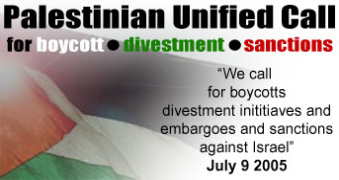
Sunday, March 28, 2010
Berkeley joins divestment movements at University of Michigan, Wisconsin, Sussex, & Wayne State University.

Thursday, March 18, 2010
Berkeley student government approves divestment against Israel.
The vote was 16-4.

According to graduate student Emiliano Huet-Vaughn, a member of Students for Justice in Palestine who co-authored the bill, companies such as Hewlett-Packard and General Electric are supplying Israel with the technology necessary to allegedly attack civilian populations in Lebanon, the Gaza Strip and the West Bank.
"Investments in companies militarily and materially helping to support war crimes and helping support systemic long-standing violations of human rights should not be companies the university supports," he said...
--------------------------------------------
Comments:
Oh my god!![]()
That's amazing! It was the UC's divestment from South Africa that got the ball rolling to end apartheid...this is just so wonderful!
Russell Bates![]()
having just returned home after being at the meeting for over 3 hours.i was impressed by the turnout and particularly impressed with the comments of pro-palestinian israeli jews and american jews who were there..they stuck and continue to stick their necks out in order to relate to the suffering of the people of palestine.all the folks there in favor of the bill struck me as reasonable and sane versus the indoctination of the pro-israeli wackos there who brought out all the worn-out lies of 'the only democracy in the middle-east',palestinians use human shields,they only want peace(piece of west bank,gaza,sy
**************************************************
Friday, March 12, 2010
Unanimous vote at University of Michigan:
"Dearborn student government pushes 'U' to divest funds from Israel"
The student government at the University’s Dearborn campus unanimously passed a resolution last month, asking the University’s Board of Regents to form an advisory committee to investigate what they view as unethical investments of endowment funds into companies that support Israel.
But according to University officials and students involved in the issue here in Ann Arbor, it doesn’t seem likely that a similar resolution will be passed in the Michigan Student Assembly any time soon.
Currently, the University invests some of its $6 billion dollar endowment in companies like Boeing, Northrup-Grumman and BAE — corporations which reportedly provide Israel with support in the form of military weapons and machinery.
Hussein Berry, the author of the resolution in Dearborn, said these kinds of University financial investments are unethical and take advantage of the Israeli-Palestinian conflict.
“There are people dying with our dollar… it’s blood money,” Berry said.
But there are currently no plans for a similar resolution in MSA. When asked if the Michigan Student Assembly would support their Dearborn counterpart, Michael Rorro, vice president of MSA, said that he couldn’t comment on that possibility specifically because “it hasn’t been brought up to the assembly in any official way.”
Rorro added that the job of the student government is to “make student life better at the University of Michigan. If a resolution like this can do that…the government can consider it.”
Richard Kallus, chair of the American Movement for Israel here, wrote in an e-mail that divestment efforts will not go far in addressing the conflict in the Middle East.
“Divestment or any talk of divestment would do nothing to solve the conflict in the region,” he said.
The U-M Dearborn student government passed similar resolutions in 2005 and 2006, but according to David Skrbina, a lecturer of philosophy and faculty advisor to the Arab Student Union at U-M Dearborn, the University didn't follow through with the resolutions because they weren't in accordance with the regents' rules on student activism.
Skrbina said instead of asking the Board of Regents to form an investigative advisory committee on the issue, the previous resolutions “went directly to divestment.”
He added that students passed the current resolution in an attempt to pressure the University to withdraw its financial support from companies involved in the conflict.
Though she hasn’t commented on it recently, University President Mary Sue Coleman said in a statement in 2002 that the University wouldn’t be divesting.
“I do not support divestment,” Coleman said in the statement. “As a matter of University policy, we do not believe political interests should govern our investment decisions.”
According to Coleman, two past instances in which the University divested — in 1978 to protest South African apartheid and in 2000 from tobacco stocks — were consequences of sustained support for the issues from the campus community.
Both Berry and Skrbina are currently working to raise campus awareness and interest in the issue of divestment. Recently, the Arab Student Union held a week-long series of events focusing on issues of divestment and the realities for Palestinians involved in the Israeli-Palestinian conflict.
Berry said though awareness of the conflict has come with the large number of Arab Americans on Dearborn's campus, he does not believe that this resolution is anti-semitic.
“The issue isn’t whether or not we should divest from Israel," he said.
"The issue is whether or not we should divest from the killing of innocent people."
Berry added that he is working to gain the support of Jewish students on Dearborn’s campus by working with groups like the Jewish Student Organization and the Jewish Voice for Peace.
In addition, Berry said he is currently circulating a petition supporting the resolution through both the Ann Arbor and Dearborn campuses, which already has the signatures of about 1,500 students and more than 200 faculty and staff members.
********************************************************

